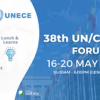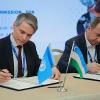News
Displaying Results 76 - 100 of 156
The heads of national statistical offices participating in the Conference of European Statisticians have (CES) welcomed UNECE’s new Guidance for measuring the impact of the Covid-19 pandemic on women and men.
The COVID-19 pandemic continues to disrupt many aspects of daily life. The…
With blockchain opening up many avenues in international trade – from facilitating financing and customs procedures to tracking due diligence and sustainability compliance – countries and companies are looking for successful practices to scale up their efforts to maximize the potential of this new…
July is a month to start enjoying the harvest of fruits and vegetables for many in Europe and the topic of reducing food loss and waste becomes very urgent. In Serbia, agriculture is an important sector of the economy, contributing around 6% of GDP. In March 2022 food production accounted for 10.4…
Last week, Parties to the UNECE Convention on Access to Information, Public Participation in Decision-Making and Access to Justice in Environmental Matters (Aarhus Convention) gathered alongside representatives of civil society, international organizations, academia, private organizations and other…
At what point do we cease to be alarmed by a shocking reality? Many of you may already be familiar with the following figures, from the last WHO Global Status Report on Road Safety (2018).
Every year 1.3 million people are killed and around 50 million injured on the world’s roads, often with…
In view of the upcoming COP 27 of the UNFCCC, taking place in Egypt later this year, the growing threats on climate created by the textile and leather sectors call for our urgent action. If we continue down this path, we will fail by 50% to meet our 2030 emissions reduction targets, resulting in…
Evidence, in the form of data and statistics, is essential for formulating and monitoring policies. The term ‘evidence-based decision-making’, so commonly used that sometimes we don’t even think about it, makes this abundantly clear.
But we don’t just need any old evidence. If we are to be sure…
Adapting to climate change and managing the risks of natural and technological hazards in transboundary basins has become critical, as the frequency and intensity of extreme weather events - such as floods, droughts, landslides or storms - are on the rise in the wake of the changing climate. Timely…
UNECE was engaged at the main global forum to assess and discuss progress in implementing the Sendai Framework for Disaster Risk Reduction (DRR) – the seventh session of the Global Platform for Disaster Risk Reduction (GP2022) held in Bali and online, 25-27 May 2022, fully embracing its theme: “…
Products today are integrating more and more advanced technologies and sustainability criteria into their design. Soft toys with computer chips, medical devices that can assist in operations and learn from past uses, repurposed plastic bottles assembled to form a new, different product… each pose…
A large, multidisciplinary team of international experts under the leadership of UNECE is working in Bishkek, assessing the environmental performance of the country by examining developments during the past decade.
The third review of Kyrgyzstan measures progress made and considers challenges…
Standards are an integral part of society and are present in nearly everything that surrounds us on a daily basis; they shape how products are designed, produced and used. They are in all products that cross borders and can play a key role to reduce technical barriers to trade as well as integrate…
Recent disruptions of supply chains have exposed fragilities in the current trading system and brought to light the importance of resilience and transparency in global trade.
UNECE and other international organizations play a crucial role in supporting countries (including both the public and…
As an established convenor of standards developing organisations, UNECE encourages the integration of a gender perspective, providing practical steps for organisations to advance women’s full and effective participation in standards and standards development. With the objective of strengthening…
The textile industry is a key driver of Uzbekistan’s economy, reflected in the country’s rank as sixth largest cotton producer in the world. In 2021, the country accelerated the battle against its child and forced labor violations in cotton harvest according to a new International Labour…
As supply chains within the garment and footwear sector are becoming increasingly complex, the need for transparency is more relevant than ever. Consumers, investors and shareholders are pressing for transparent business activities as well as the prevention and mitigation of risks in value chains,…
There is overwhelming evidence that we need robust management and traceability for the sustainable and circular supply and use of climate-critical raw materials. Calls are increasing for the production of raw materials to embrace circularity. Demand for batteries and other low carbon technologies…
Global trade has been transformed repeatedly throughout history, driven by new business processes and new policies. The new advances in digitalization now promise further transformation by making it faster, more transparent, reducing risks of red tape and corruption. With the increase in global…
Over 60 participants worldwide joined the online roundtable organized by the UN Digital transformation group for Europe and Central Asia (DTG4ECA) in the framework of the Regional Forum on Sustainable Development for the UNECE region. Established in May 2020, DTG4ECA group, co-chaired by UNECE and…
The transition to a decarbonized energy sector is a critical step for keeping global warming below 2°C. To succeed, countries will need to phase out, or at least substantially limit the use of coal. While the benefits of the green transition are numerous, it will require a deep structural shift…
As guests of the planet, we human beings can thrive only if our host environment is thriving. We are strongly connected to it, more than we probably understand and more than we probably dare to admit.
Conversely, the ways humans treat the environment has clear negative effects on our health and…
The second Environmental Performance Review (EPR) of Armenia kicks off in Yerevan under the lead of UNECE and carried out by a large, multidisciplinary team of international experts. This is the 56th EPR since the establishment of the UNECE EPR Programme over a quarter of a century ago. Armenia has…
Millions of people are experiencing the severe impacts of climate change, through unprecedented extreme weather episodes and more frequent disasters. According to the Chair of the Intergovernmental Panel on Climate Change, Hoesung Lee, its latest report, released last week, “is a dire warning about…
Minerals such as lithium, cobalt, and copper are essential for digitalization, for renewable energy technologies, and for the further deployment of electric vehicles. Demand for these and other minerals – known as “critical raw materials” (CRMs) – is growing fast as governments and businesses act…
Strengthening value chains between Africa and the European Union (EU) is a priority objective for sustainable growth and decent jobs across the two continents. Recent market imbalances and disparities, involving supply chain disruptions and lack of attention to the social and environmental impacts…


























